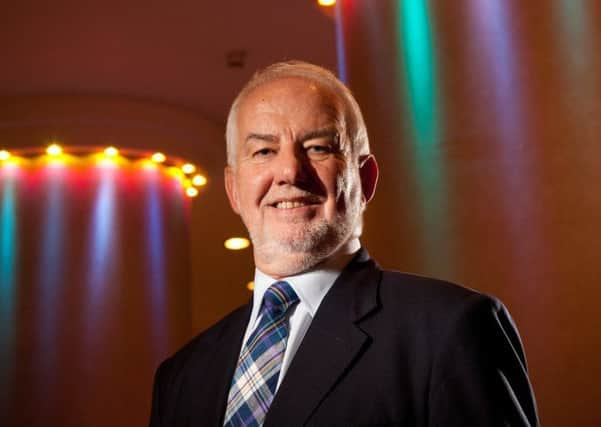Monday interview: IoD Scotland director David Watt
This article contains affiliate links. We may earn a small commission on items purchased through this article, but that does not affect our editorial judgement.


He knew at the time the June Brexit vote was coming, but not that the repercussions of it would be Theresa May would call the impending UK general election.
“I did not get my way in spades,” he laughs. “We don’t as the business community have much option but to just get on with it. I’ll be glad when it is over. It is a hackneyed line, but business wants certainty to plan, and you don’t have it if you are having Brexit, elections etc.”
• READ MORE: General election news
Advertisement
Hide AdAdvertisement
Hide AdWatt says he was surprised at the outcome of the Brexit referendum even if most Scots voted Remain. “Yes, I was surprised and most of our members were as well to be honest,” he says. “They did not see a strong economic argument for leaving the EU. It was just about political autonomy and EU rules and regulations.”
Asked if Brexit and Donald Trump’s election as president in the US had shown that electorates are now no longer voting on purely economic grounds, Watt says: “Right. But it’s sad. Politicians are talking about lots of things, but not focused on the economy and its implications. And yet without a strong economy there’s less tax for the politicians to spend.”
• READ MORE: Scottish economy fears as UK growth revised downward
It is well known that the UK economy was surprisingly resilient in the six months or so after the Brexit vote, confounding many doomsters. But in recent months, including last week’s slowing UK GDP figures for the first quarter of 2017, a shadow has been cast on the general economic prospects. The services sector has taken a hit as consumers have been squeezed by stagnant earnings growth and rising inflation, while exporters have not seemed to have been able to capitalise on the sharp fall in sterling since the Brexit vote.
Watt says: “Initially companies were selling more abroad as they were getting a 20 per cent uplift in income from the weakness of the pound with no extra effort. But now raw material prices are going up and feeding into high street prices and the impact on companies is being felt. And I can only see inflation going further upwards in the next 12 months.”
One political worry Watt doesn’t have is the disruption to business of a second Scottish independence referendum. “I don’t think there will be an indyref2 in the foreseeable future. Any Tory government has said they won’t allow another Scottish referendum through parliament in the next four or five years. All our members will have their own views but anything that pushes it (another vote) away for five years would be welcome.”
Theresa May’s new, more interventionist industrial strategy met a fairly muted business reception when it was launched earlier this year. However, Watt says he welcomed the development for a “joined up” industrial strategy while noting wryly that there appeared to be “no real new money” from Whitehall backing it. Even so, he added that the industrial strategy was “in principle a good thing”.
Advertisement
Hide AdAdvertisement
Hide AdTwo other aspects of May’s stance towards business that have attracted attention is her disdain for overly generous remuneration and bonuses, and the fact that her government, if returned to power on 8 June, does not believe in completely untrammelled markets. Watt says the IoD in Scotland, like its counterpart down south, did not support outlandish wages and bonuses “as most people would not, it’s a bad thing”.
But he says investors had a key role to play. “Shareholders need to stand up and be counted. It’s their money. Thankfully, they have started to question payments and award systems,” he adds.
Watt is far less comfortable on May’s comments suggesting a possible Whitehall thumb on the scale if untrammelled markets are deemed to be disadvantageous to the consumer. He says: “Free markets are a real concern as soon as you start interfering, like the fixing of utility prices. She [May] pilloried Ed Miliband for saying he would do the same thing.”
The biggest issue exercising IoD members, he says, is any potential choking off of EU immigrant labour as part of any Brexit deal.
Watt adds: “They are worried about retaining their workforce, and had previously anticipated that many of their future workers would also come from European countries. Our demographics are also worse than England’s, with less children (and therefore future workers) being produced. It is an issue.”
30-SECOND CV
Born: A long time ago, in Kilmarnock
Educated: Jordanhill College, and the Open University
What did you want to be at school? A teacher, or a professional footballer
First serious job? PE teacher
Best piece of business advice ever given to you? Listen, not just to criticism, but where it came from
Advertisement
Hide AdAdvertisement
Hide AdWhat couldn’t you live without? My wife, dog, golf clubs (in that order)
Favourite mode of transport? Aeroplane
Last holiday destination? Turkey
What makes you angry? People doing ungodly things in the name of God
Best thing about your job? Meeting new people every day – all doing fantastic things